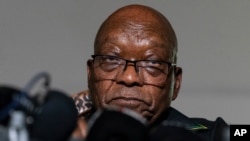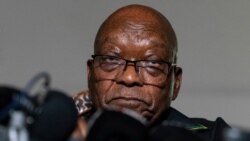Former South African President Jacob Zuma is to be freed from prison after serving just two months of a 15-month sentence for contempt of court.
South Africa's Department of Correctional Services granted the 79-year-old, who’s also due to stand trial soon on multiple corruption charges, medical parole because of "ill health."
The decision means Zuma will serve the rest of his sentence at his home in KwaZulu-Natal province.
He was jailed for defying a Constitutional Court order to testify at an inquiry investigating graft that happened when he led South Africa between 2009 and 2018.
Nthabiseng Dubuzana, Zuma's lawyer, said the requirements necessary for an inmate to be given medical parole are clear.
"They cannot take care of themselves, basically, while under correctional supervision, or whether the medical staff at correctional supervision cannot deal with the kind of illness," he said.
Dubuzana said if Zuma’s is suffering from a very serious condition, it would seem he qualifies for medical parole.
The former president won’t disclose his ailments, saying the information is private.
Correctional Services spokesman Singabakho Nxumalo, said Zuma had an operation a month ago and has spent most of his two months in a prison hospitall.
Opposition party leaders are outraged by the decision to free Zuma,
"There’ve been many applications from prisoners who are terminally ill that have been turned down, and it’s ironic that this case has obviously been prioritized," said Democratic Alliance leader John Steenhuisen. "This points to a political decision rather than a medical decision."
But Zuma’s spokesman, Mzwanele Manyi, said the decision to give the former president parole isn’t based on politics, but on "humanity."
"It also indicates the precarious state of President Zuma’s health," Manyi said. "This decision is a product of two teams of doctors: the military hospital doctors and the Correctional Services doctors."
But, as Steenhuisen said, final parole decisions are supposed to be made by an independent medical board.
In Zuma’s case, it appears as if Correctional Services relied only on reports from a military doctor, who’s actually the former president’s personal physician, and the department’s doctor, who Steenhuisen describes as "compromised."
"What muddies the waters here even more is that we all know who the national commissioner of Correctional Services is; it’s Arthur Fraser," he said. "He’s the very man who was Jacob Zuma’s spymaster and subverted the state to protect Mr. Zuma and his allies."
Zuma refused to be examined by independent doctors.
Legal experts said, based on this, and the fact that the prisons system failed to constitute the necessary medical board, the state could appeal his parole.
But political analysts said President Cyril Ramaphosa is unlikely to do so, for fear of alienating ANC supporters ahead of the elections.
Zuma’s support remains strong and he usually helps bring in millions of votes for the ruling African National Congress. Those votes are sorely needed by a party that political analysts say is in lagging ahead of next month’s polls to elect leaders in cities and towns around South Africa.
Zuma’s imprisonment in early July sparked riots, looting and destruction in several cities. The chaos caused about 350 deaths, thousands of injuries and arrests, and damage running into billions of rands.







